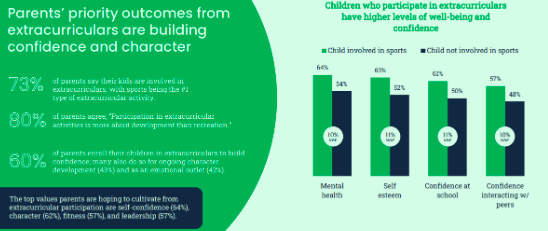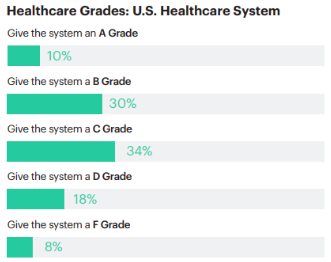Brief • 5 min Read
This week marks the end of the federal COVID-19 public health emergency. But many Americans have forgotten. In our America This Week survey, fielded from May 12th to 14th, of 2,019 Americans, half the U.S. (50%) are still concerned about a new variant.
Speaking of health, our CEO John Gerzema will be in Nashville on Saturday to deliver a keynote of new Harris Poll research on The Future of Healthcare for The American Association of Physician Assistants (AAPA). More on that below.

AAPA Conference Nashville Saturday, May 20th, 2023
This week we have four new stories, including the mental health risks of remote work for parents. And with the success of ‘Air’ and others, we explore the rising phenomenon of brands in major motion picture films. (Has Hollywood run out of comic book heroes?)
Next, new Harris research shows the importance of sports for children’s character development, and in a new Harris study in TIME asks how to fix a U.S. healthcare system that (60%) of Americans grade as a C, D, or F.
You can download the new ATW monthly summary tabs and the new April deck here.
Remote Work’s Hardship on Parents: Bright Horizons-Harris Poll
Though it’s been praised for providing greater work/life balance, many parents find that remote work can also have serious drawbacks, according to a new Harris-Bright Horizons study in USA Today.
- The isolation of WFH: (41%) of parents say that when they work from home, there are times they go days without leaving their house, and a third (33%) say they “feel very isolated” when working remotely.
- Juggling jobs and family: Eight in ten parents who work at least part-time remotely juggle jobs with their family responsibilities during the workday, with (47%) running their kids to activities and (44%) helping with their homework.
- The career downfalls of remote work: Over a third (35%) of WFH parents believe their hybrid schedule negatively affects their careers, and (40%) would like their managers to advise them on how much time they should be in the office.
Takeaway: “Their angst comes at a time when employers’ empathy for the challenges of juggling parenting with work is waning, says Bright Horizons CEO Stephen Kramer, leading more moms and dads to again worry about finding accessible, affordable child care while fretting that family responsibilities could derail their climb up the career ladder” (USA Today).
Brands Go To The Movies: Marketing Brew-Harris Poll
Barbie pink is the hot shade this summer. Greta Gerwig’s movie adaptation of the iconic doll is set to be released this summer, and it’s one of several brands getting the Hollywood treatment this year: Flamin’ Hot Cheetos, Nike, and Pop-Tarts are also taking on main-character status in films throughout 2023. And according to a new Harris study with Marketing Brew, Americans are ready to tune in.

The Barbie Movie, 2023
- Brands hit the big screen: (60%) of Americans said they were “more interested in seeing movies that depict their favorite brands in some way.” And the same number said their opinion of a brand wouldn’t change if it were involved in the production – like Mattel’s involvement in the Barbie movie.
- Plot over the sales pitch: Over half (54%) said they worried that too much brand involvement could make films feel like commercials instead of stories, with nearly half saying it would lead to poorer-quality storylines (49%).
Takeaway: It will be a balancing act for brands. Take the film ‘Air’ as a test case. Among those who saw Air, two-thirds (67%) said it felt “less like a movie” and “more like an advertisement for Nike.” However, nearly nine in ten (86%) who saw the film said they were more interested in purchasing something from Nike after seeing it.
Why Parents Think Character is Built Through Sports: First Tee-Harris Poll
Character is what we are admired for and remembered by. Yet according to parents, our new study with First Tee, ‘character’ is a lost value driven by a lack of regular opportunities to cultivate it.
- (85%) parents say that character is a lost value that should be emphasized in today’s society.
- And more than half (53%) say they are concerned that their child(ren) doesn’t have enough opportunities to build character in their day-to-day life.
- However, parents unanimously agree about the potential of sports: Over 9 in 10 parents say that sports create opportunities to learn life skills and build character (95%) – and three-quarters say golf helps explicitly build character and teaches children essential life skills.
- And beyond being a character builder, sports also help boost children’s confidence:

First Tee-Harris Poll May 2023
Takeaway: Experiences are our greatest teacher. And we believe in developing the ones that are just as fun as they are meaningful, where kids feel excited to grow, safe to fail, and better equipped for whatever comes their way next.
Patients Vent Frustration with Healthcare: AAPA-Harris Poll
We partnered with The American Academy of Physician Associates (AAPA) to understand patients’ issues in today’s healthcare system. And while problems are plenty, patients are building closer relationships with providers, especially physician assistants, whom they see as helping them navigate a complex, often dysfunctional system.

AAPA-Harris Poll May 2023
- Americans aren’t impressed with the healthcare system: Less than half (40%) gave the U.S. healthcare system an A or B rating (10%, 30%, respectively) – in part as 7 in 10 say the healthcare system isn’t meeting their needs.
- The system says, “See you when you’re sick”: Two-thirds (65%) of patients agree that coordinating and managing healthcare is overwhelming and time-consuming, and a similar number (61%) say they only seek care when they’re sick.
- And U.S. healthcare isn’t equitable: (61%) disagree that “the U.S. healthcare system serves all people equally.”
- The anxious healthcare outlook: Most Americans fear healthcare equality will suffer as care increasingly becomes too focused on profit (81%) and healthcare workforce shortages will impact them as patients (68%).
- Fighting back by owning health: Nearly half (47%) say, “I am prioritizing staying physically active more today compared to before the pandemic,” and (43%) are “meeting my health habits.”
- However, patients aren’t giving up: (71%) agree that they want stronger relationships with their healthcare providers, and the same number (71%) feel that healthcare providers have taken time to build trust with them.
- Set Physician Assistants loose: Nine in ten (92%) patients say “P.A.s should be allowed to provide care to the fullest extent of their education, training, and experience,” and (91%) say “fully utilizing (them) improves patient health.”
Takeaway: What struck our CEO John Gerzema from the research is how clearly the system is getting in the way of people being able to take care of themselves and the ones they love. Healthcare is costly and confusing, and it takes too long to get needed care. The result is that people want to engage with it less, which can lead to even more health problems – both physical and mental. So practitioners like physician assistants are front-line providers, navigators, healers, and helpers. We need more of them.
Subscribe for more Insights
Subscribe to our newsletter for the latest trends in business, politics, culture, and more.
Download the Data
This survey was conducted online within the U.S. by The Harris Poll from May 12th to 14th among a nationally representative sample of 2,019 U.S. adults.
Download
Subscribe for more Insights
Subscribe to our newsletter for the latest trends in business, politics, culture, and more.
Download the Data
This survey was conducted online within the U.S. by The Harris Poll from May 12th to 14th among a nationally representative sample of 2,019 U.S. adults.
DownloadRelated Content







